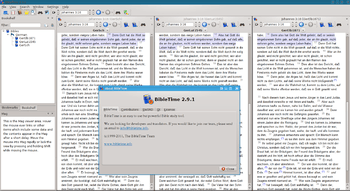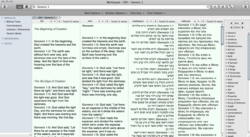The SWORD Project
The SWORD Project is the CrossWire Bible Society's free software project. Its purpose is to create cross-platform open-source tools—covered by the GNU General Public License—that allow programmers and Bible societies to write new Bible software more quickly and easily.

Overview
The core of The SWORD Project is a cross-platform library written in C++, providing access, search functions and other utilities to a growing collection of over 200 texts in over 50 languages.[1] Any software based on their API can use this collection.
JSword is a separate implementation, written in Java, which reproduces most of the API features of the C++ API and supports most SWORD data content.
The project is one of the primary implementers of and contributors to the Open Scripture Information Standard (OSIS), a standardized XML language for the encoding of scripture. The software is also capable of utilizing certain resources encoded in using the Text Encoding Initiative (TEI) format and maintains deprecated support for Theological Markup Language (ThML) and General Bible Format (GBF).
Bible study front-end applications

A variety of front ends based on The SWORD Project are available:
And Bible
And Bible, based on JSword, is an Android application.
Alkitab Bible Study
Alkitab Bible Study, based on JSword, is a multiplatform application with binaries available for Windows, Linux, and OS X. It has been described as "an improved Windows front-end for JSword".[2]
The Bible Tool
The Bible Tool is a web front end to SWORD. One instance of the tool is hosted at CrossWire's own site.[3]
BibleDesktop
BibleDesktop[4] is built on JSword featuring binaries for Windows (98SE and later), OS X, and Linux (and other Unix-like OSes).
BibleTime
BibleTime is a C++ SWORD front end using the Qt GUI toolkit, with binaries for Linux, Windows, FreeBSD, and OS X.
BibleTime Mini
BibleTime Mini is a multiplatform application for Android, BlackBerry, jailbroken iOS, MeeGo, Symbian, and Windows Mobile.
BPBible
BPBible is a SWORD front end written in Python, which supports Linux and Windows. A notable feature is that a PortableApps version of BPBible is available.
Eloquent
 Eloquent running on Mac OS X Snow Leopard with four different panes open. | |
| Developer(s) | Manfred Bergman |
|---|---|
| Stable release | 2.4.10
/ October 9, 2014 |
| Preview release | Non [±] |
| Repository | |
| Written in | Objective-C |
| Operating system | macOS |
| Available in | Multilingual |
| Type | Biblical software |
| License | GPL |
| Website | Eloquent |
Eloquent (formerly MacSword) is a free open-source application for research and study of the Bible, developed specifically for Macintosh computers running macOS. It is a native OS X app built in Objective-C. Eloquent allows users to read and browse different bible translations in many languages, devotionals, commentaries, dictionaries and lexicons. It also supports searching and advanced features such as services enabling users to access the Bible within other application programs.
Eloquent is one of About.com's top 10 Bible programs.[5]
Version 2.3.5 of Eloquent continues with the Snow Leopard development. However, starting with the version 2.4.0, Eloquent has started with the OS X Lion testing, implementing features that are specific only to the Lion operating system.
| Version | Release date | Features | |
|---|---|---|---|
| 2.3.3 | June 15, 2011 |
|
|
| 2.3.5 | July 16, 2011 |
|
Ezra Project
Ezra Project[6] is an open source bible study tool focussing on topical study based on keywords/tags. It is based on Electron and works on Windows, Linux, and OS X.
PocketSword
PocketSword is an iOS front end supporting iPad, iPhone, and iPod Touch available in Apple's App Store.[7]
The SWORD Project for Windows
The SWORD Project for Windows (known internally as BibleCS) is a Windows application built in C++Builder.
Xiphos
Xiphos (formerly GnomeSword) is a C++ SWORD front end using GTK+, with binaries available for Linux, UNIX, and Windows (2000 and later). It has been described as "a top of the line Bible study program."[8]
xulsword
xulsword is a XUL-based front end for Windows and Linux. Portable versions of the application, intended to be run from a USB stick, are also available.
Reviews
- It is one of About.com's top 10 bible programs.[12]
- Bible Software Review, Review of MacSword version 1.2, June 13, 2005.
- Foster Tribe SwordBible Review November 25, 2008
- Michael Hansen, Studying the Bible for Free, Stimulus, Volume 12 Number 3, August 2004, page 33 - 38
See also
- Biblical software
- Go Bible – a free Bible viewer for the Java ME platform
- Palm Bible Plus – a free Bible viewer for Palm OS
- List of free and open-source software packages
References
- Al Fasoldt (2004-04-11). "Religion Meets Computer Revolution". The Post-Standard (Syracuse, New York). Archived from the original on 2011-05-17. Retrieved 2008-03-17.
- "Bible Software Review". Retrieved 2008-12-24.
- "The Bible Tool". Retrieved 2014-01-04.
- "Bible Desktop 1.0 Released". Linux News. 2006-01-10. Retrieved 2008-03-17.
- Fairchild, Mary. "Top 10 Bible Software Programs". About.com. Retrieved 2 January 2014. Listed under old name MacSword.
- "Ezra Project on GitHub".
- PocketSword
- David A. Utter (2006-09-13). "Linux: The Flash and the Fish". WebProNews. Archived from the original on 2008-10-11. Retrieved 2008-03-17.
- diatheke
- "Archived copy". Archived from the original on 2013-06-23. Retrieved 2014-01-05.CS1 maint: archived copy as title (link) SwordReader
- Rapier
- Fairchild, Mary. "Top 10 Bible Software Programs". About.com. Retrieved 2 January 2014.